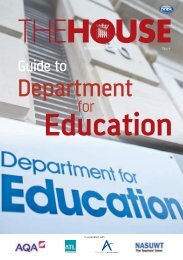Oracy
2fcBkno
2fcBkno
Create successful ePaper yourself
Turn your PDF publications into a flip-book with our unique Google optimized e-Paper software.
Executive Summary<br />
What does this report do?<br />
This report shines a light on the current state of oracy in<br />
schools across the UK. It synthesises existing research<br />
on oracy, and explores teachers’ understanding of<br />
what oracy is, why they feel it matters, how oracy is<br />
supported in classrooms and schools, and the main<br />
barriers to oracy. It then sets out recommendations for<br />
enhancing the quality and consistency of oracy in our<br />
schools.<br />
“[Talk is] the most powerful tool of<br />
communication in the classroom<br />
and it’s fundamentally central to<br />
the acts of teaching and learning”<br />
Professor Frank Hardman i<br />
It is ‘very important’ I help my pupils develop the following skills 906<br />
100%<br />
80%<br />
60%<br />
75%<br />
63%<br />
68%<br />
73%<br />
40%<br />
20%<br />
0%<br />
Reading Numeracy <strong>Oracy</strong> Writing<br />
What have we found?<br />
1. Teachers across the UK feel oracy is critically important, and are even more likely to say it is<br />
‘very important’ they develop pupils’ skills in oracy (see graph above) than in numeracy.<br />
2. Teachers believe oracy matters because it is the bedrock of pupils’ ability to use language<br />
and communicate. They also highlight its social and emotional benefits. Despite employers<br />
placing huge importance on oral communication, teachers are less likely to emphasise its<br />
cognitive, civic and economic potential, suggesting oracy has untapped potential to support<br />
pupils’ job prospects.<br />
3. Many teachers say they frequently use a range of strategies to develop pupils’ oracy, but<br />
worry that support for oracy across different lessons, classrooms and schools is currently<br />
patchy.<br />
4. Schools do not consistently provide meaningful opportunities for pupils to develop oracy<br />
outside the classroom. Pupils’ opportunities tend to be limited to speaking in assemblies, and<br />
few schools evaluate the quality of pupils’ verbal contributions in lessons, or communicate<br />
with parents about the quality of these contributions. This is concerning given high quality<br />
talk should underpin good teaching and learning.<br />
5. The greatest barrier standing in the way of quality and consistent oracy in all lessons is a<br />
lack of time, but other constraints include:<br />
• Teachers’ anxiety that shy and under-confident pupils might struggle, or that pupils’<br />
behaviour will get worse<br />
• Teachers prioritising other tasks and, in particular, pupils’ writing<br />
• Teachers’ lack of confidence and expertise, exacerbated by a paucity of training<br />
• Teachers’ perception that oracy is only occasionally relevant when teaching, or<br />
relevant only in certain subjects such as English<br />
• A lack of active support from school leadership<br />
i<br />
Professor of Education at the University of York (key Informant interview).<br />
5




